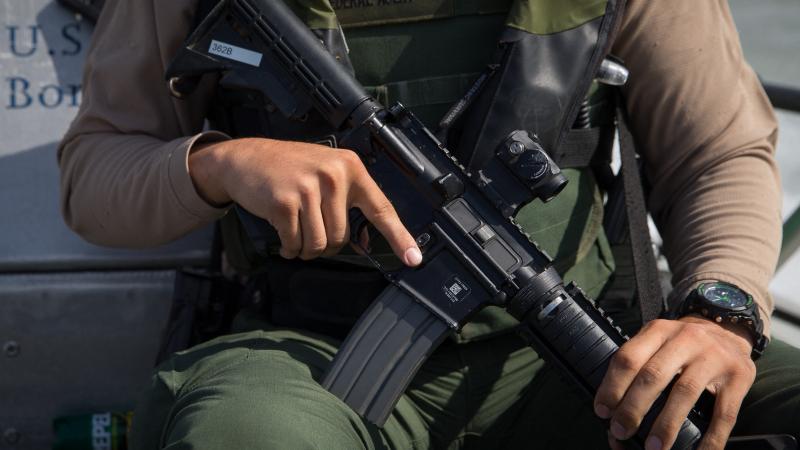Multi-agency operation in Texas nabs 33 violent gang members in border town of Uvalde
“Gang violence has no place here in Texas, we will bring the full force of justice down on these famous criminals,” Gov. Greg Abbott said.
Thirty-three members of violent gangs were arrested as part of a multi-agency operation targeting transnational and organized crime in the border town of Uvalde, Texas, and surrounding area in Uvalde County.
“Gang violence has no place here in Texas, we will bring the full force of justice down on these famous criminals,” Gov. Greg Abbott said when directing Texas Department of Public Safety to surge resources there to root out organized crime in September 2022.
Nearly two years ago, a multi-agency operation began, made possible through additional state funding and criminal investigative oversight from DPS targeting an extensive organized crime network operating at the Texas-Mexico border. The investigation focused on the selling and distribution of narcotics, weapons, extortion, aggravated assaults and organized criminal activity of multiple gangs associated with transnational criminal organizations, including Mexican cartels.
DPS deployed special agents to target gang activity in the Uvalde area with a priority of focusing on Tango affiliated gangs and the Latin King gang, which are classified by DPS as Tier 1 and Tier 2 gangs, respectively.
After an extensive investigation, 33 gang members were arrested, including from the Latin Kings, West Texas Tango, Tango Blast, Tango Orejon, Tango Aguilon, Texas Syndicate, Paisa, Texas Mexican Mafia, Maniac Latin Disciples, and San Antonio Walked Down Gang, according to a statement from the Uvalde County Sheriff’s Office.
The 38th Judicial District handed down 68 state indictments related to narcotics trafficking and engaging in organized criminal activity. The U.S. Western District, Del Rio Division, handed 17 federal indictments related to racketeering and conspiracy.
Texas DPS criminal investigators have identified gang activity “as a growing and serious problem in Uvalde and the surrounding area.”
Joining them in the investigation were investigators with the Uvalde County Sheriff's Office, Uvalde Police Department, and U.S. Department of Homeland Security Investigations. The 38th District Attorney’s Border Prosecution Unit and the U.S. Attorney’s office are prosecuting the case.
The investigation targeted the Uvalde area nearly 10 years after a joint operation in 2015 vanquished major gang operations there resulting in the Latin Kings being disbanded, the sheriff’s office said. Since that time, gang activity increased with the “most recent gang activity involve[ing] some of the children of those former incarcerated gang members.”
The investigation was a collaborative effort “to identify and combat violent crime from the southern border of the United States,” the sheriff said.
“We will not tolerate this criminal activity in our community,” District Attorney Christina Mitchell said. “We will uncover anyone who participates, collaborates or permits this cancer in our town.”
She also said she anticipated more indictments and arrests coming from the investigation.
The indictments and arrests were issued after 33 Latin King members and associates were convicted in October 2020 on federal racketeering charges.
Formally known as the Almighty Latin King and Queen Nation, the Latin King gang has tens of thousands of members operating in chapters in different states, law enforcement officials have explained to The Center Square. In 2020, 33 members of the Austin, San Antonio and Uvalde chapters of the Latin King’s Central Region of Texas, were sentenced to between 45 and 288 months in federal prison. They were convicted for their role in operating a criminal enterprise in Central Texas for ten years beginning in 2005, according to the U.S. Attorney’s Office, Western District of Texas.
Four leaders received the most prison time of between nearly 16 years and 22 years. They include the leader of the Texas-Central Region, “Inca” Pete Perez, in Austin; San Antonio’s chapter leader, “Inca” Joe Pierce (“Dro”); Uvalde’s chapter leader, “Incas” James Marty Long (“Whiteboy”) and Jacob Mariscal (“Righteous”).
They were convicted and sentenced for conspiring “to carry out unlawful acts including attempted murder, assault with a dangerous weapon, extortion, robbery, various firearms offenses and drug distribution involving marijuana, cocaine and methamphetamine.”
“Violent gangs like the Latin Kings are made up of members who wake up each and everyday intent on committing violence, dealing drugs, breaking our laws and threatening our social fabric. Simply put, they cannot be allowed to run unchecked in our streets,” stated U.S. Attorney Gregg Sofer said at the time.
Acts of violence perpetrated by the gang members, according to court records, include: assaulting a rival gang member by beating “his head, face and body with rocks, bats, and glass bottles;” conspiring to shoot a rival gang member, and providing the gun to do so, in retaliation for a Latin King member being stabbed; driving a vehicle into rival gang members; using women to lure rival gang members to a residence where “they were stabbed, punched, kicked, and beaten with a baseball bat;” among other acts of violence including shootings, stabbings and beatings.














